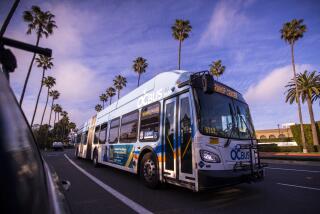O.C. panel OKs bus firm despite rider complaints
- Share via
Despite a track record that includes leaving disabled bus riders stranded and being hours late for pickups, Orange County transportation planners will recommend that the county continue to pay $30 million a year to a private transit firm to bus disabled passengers.
Switching firms, officials believe, would cause too many disruptions. Recent scheduling and dispatching changes have improved service by Oak Brook, Ill.-based Veolia Transportation, but only “incrementally,” said Erin Rogers, Orange County Transportation Authority manager of transportation services.
Rogers told an OCTA committee Thursday that Veolia’s on-time performance improved from 89% to 91%, but still failed to reach the 94% level the contract called for.
“Veolia has put in place a number of strategies for scheduling and dispatching,” Rogers said, adding that those strategies had helped Veolia’s performance.
The committee voted 3 to 1 to recommend that the full OCTA board keep Veolia and continue scrutinizing performance for 90 days. It’s the firm’s second evaluation since taking over the contract after winning the bid in July over Laidlaw Transportation.
Supervisor John Moorlach, who is on the committee and cast the dissenting vote, said he was fed up hearing about delays and complaints from disabled clients getting picked up late under OCTA’s Access program.
“We’re baby-sitting a vendor for another 90 days,” Moorlach said. “Give me a break. We need to make incremental improvements on our own.... I can’t hold hands with vendors who can’t produce.”
The committee’s recommendation goes to the full board Monday.
Although Veolia’s performance has not met standards, the firm is seeking more money, said Art Leahy, OCTA’s chief executive. He said Veolia was seeking additional funds because of higher costs. He didn’t have details on what those higher costs were, and Veolia could not be reached for comment.
Asking for more money could doom Veolia’s contract chances with board members such as Moorlach, said Greg Winterbottom, the committee’s chairman.
Winterbottom, who is disabled, said he voted for Veolia only because of recent support for the firm from the disabled community, including the Dayle McIntosh Center, an advocacy group.
They’re “helping 4,800 people a day, and you will always have people upset because it’s very difficult providing services to people with disabilities,” he said. “But I think they’re going to be able to do as good a job as anybody can at this point.”
Drivers have been late with pickups and hazy on destinations, sometimes arriving an hour late or longer, prompting numerous complaints from riders who have missed appointments or been left waiting at hospitals, medical centers and shopping plazas.
Deb Vanderhulst, who is disabled, said she rode in an Access bus this week and the driver kept looking down at the floor. “He kept hitting curbs and had cars honking at him. He couldn’t read a map.” Veolia officials have told OCTA that they failed to hire enough bus drivers and had problems training them, and experienced scheduling difficulty because of new software.
The bus company stressed the large size of the operation and the difficulty in managing a program that picks up nearly 5,000 riders daily, and dispatches more than 230 buses in an urban area with heavy traffic patterns.
Several drivers who were contacted said they had noticed positive scheduling changes with Veolia, and attribute that, in part, to a new project director, the third in nine months.
*
More to Read
Sign up for Essential California
The most important California stories and recommendations in your inbox every morning.
You may occasionally receive promotional content from the Los Angeles Times.













